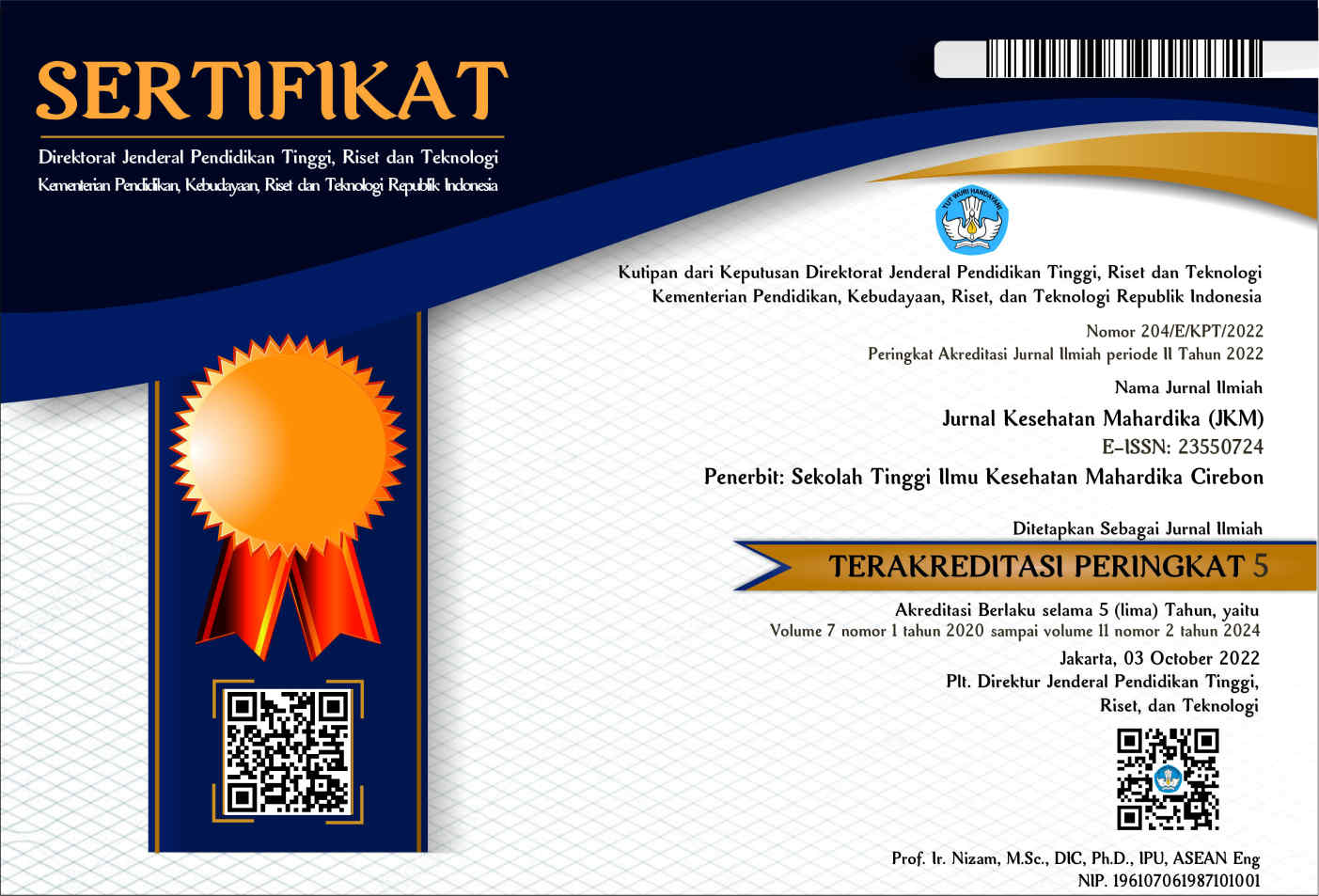Relationship Between Knowledge and Husband Support Used Intra Uterine Device (IUD) In Multiparous Mother In The Work Area Cangkol Public Health Center Cirebon City
Keywords:
Knowledge, Husband Support, Family Planning, Intra Uterine DeviceAbstract
Family planning is a government program to set the population rate in Indonesia which use a contraceptive method. Contraception methode are divided into two types, namely Metode Kontrasepsi Jangka Panjang (MKJP) and Non Metode Kontrasepsi Jangka Panjang (Non MKJP). There are 2782 active KB participants, but the use of IUD contraception is still low which is around 13,1%. The purpose of this research were to determine the relationship between knowledge and support from husbands with the use of IUDs in multiparous mothers in the Cangkol Health Center, Cirebon City. The type of research used is analytic observational Population is Fertile Age Women (WUS) Period August - December 2018 which collected 2,758 people and took samples using simple random sampling technique taken by 97 respondents. Data analysis used univariate and bivariate analysis. Collecting data using data from the Cangkol Health Center and a questionnaire about knowledge, husband's support and use of the IUD and statistical tests using Chi Square. The results showed that most of the multiparous mothers had sufficient knowledge about the IUD as many as 48 people (49.5%). Most of the husbands did not support the use of the IUD, as many as 75 respondents (77.3%), and most of them did not use the IUD, namely 80 respondents (82.5%). There is no relationship between knowledge and IUD use with p value = 0.152 (p value> 0.05). There is a relationship between husband's support and the use of the IUD with p value = 0.05 (p value <0.05). It is recommended for health workers to provide educational packages for married couples about family planning, especially for husbands about IUDs and to increase the role of health workers in motivating married couples who want to do family planning. So, it is suggested for health workers to give the education for couples about family planning programme, especially about IUD, and to improve the role of health workers to motivate the couples that want to get family planning programme.
References
Ayu, Komang. Dkk. (2014) Hubungan persepsi ibu tentang dukungan suami terhadap tingkat keberhasilan Inisiasi Menyusu Dini (IMD) di Rumah Sakit umum Daerah Kota Yogyakarta. Skripsi. UGM.
BKKBN, 2015. Informasi Data Program KB Nasional. BKKBN Indonesia.
Bobak, Irene. M., Lowdermilk., and Jensen. 2004. Buku Ajar Keperawatan Maternitas. Edisi 4. Jakarta : EGC.
Dagun, M. S. (2002). Psikologi Keluarga. Jakarta : Rineka Cipta.
Handayani Sri, 2010. Buku Ajar Pelayanan Keluarga Berencana. Yogyakarta : Pustaka Rihama.
Pertiwi, Agustin P. (2013). Hubungan usia, paritas dan dukungan suami dengan pemilihan kontrasepsi IUD di Dusun Getasan Lab. Semarang Tahun 2013. STIKes Aisyiyah.
Siswosudarmo, H.R., Anwar, H.M., & Emilia, O., 2010,Teknologi Kontrasepsi, Yogyakarta: Gadjah Mada UnevrsityPress.
Suratun. 2008. Pelayanan Keluarga Berencana dan Pelayanan Kontrasepsi. Jakarta: Trans Info Media.
Published
How to Cite
Issue
Section
Copyright (c) 2022 Jurnal Kesehatan Mahardika

This work is licensed under a Creative Commons Attribution-NoDerivatives 4.0 International License.













